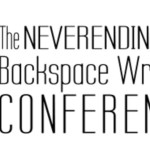 I recently participated in an online writing conference offered by Backspace Writers Conference (http://www.backspacewritersconference.com/). Their conferences run four days and include six attendees from all parts of the country. This particular one focused on manuscript submission materials: a query letter and a two-page sample. Two literary agents critiqued the query letters and two different ones the samples.
I recently participated in an online writing conference offered by Backspace Writers Conference (http://www.backspacewritersconference.com/). Their conferences run four days and include six attendees from all parts of the country. This particular one focused on manuscript submission materials: a query letter and a two-page sample. Two literary agents critiqued the query letters and two different ones the samples.
For the critiques, you call into a conference number and the session takes place on the phone. That’s not an ideal setup, since people live and work in noisy places and for some reason decline to use their mute button, so the background can overwhelm the conversation. Also, since many people use cell phones, dropouts are common, making conversation more difficult. There is no fixed protocol for the conversation (e.g., like GotoMeeting.com or some of those), and people do not introduce themselves each time they speak so you often don’t know who is talking. So it’s not an ideal situation, but it more or less gets the job done.
I received a useful critique of my query letter, although I don’t know how much to trust it. One agent said I should reverse the order of my first two paragraphs, but didn’t give a reason other than personal preference. They said the letter was too brief, something I have never heard any agent say about any query letter before. Both agents were obsessed with the plotline, not interested in character, although this was a conference focused on mysteries and thrillers, so that’s perhaps understandable. They also wanted more author bio information, the relevance of which escapes me.
I also learned by listening to the agents’ critiques of the other five queries, but again, the feedback seemed a little odd so I don’t know how seriously to take it. For example one query, way too long and convoluted, in my opinion (I could hardly understand it), was weirdly formatted and surrounded by a black border tombstone. Both agents found a lot to like with that query. Eventually they did get around to cautioning against the non-standard typography. But only at the very end, as an afterthought, did one of them draw attention to the fact that the novel being pitched was 185,000 words. Maybe these agents were instructed to be more kind than critical. These conferences are operated as a business, after all, so there is a built-in conflict of interest.
Critique of the two-page writing sample was more informative because there was more material to work with, and because of more critical and articulate agents. My sample was criticized for expositional dialog, a fair comment. Ironically, the incident the characters discussed was just a routine case so they could reveal their conflict and how they speak and act. Apparently that is a poor strategy and I need to engage the characters in the actual story right away. Valuable feedback.
Each conference calls last about an hour, one on Tuesday, one on Wednesday. For the last two days of the conference, attendees are supposed to use the discussion board to talk among themselves on any topic. Most didn’t. The agents were invited to participate in these discussions also, and some did.
So basically, you pay $225 for two one-hour conference calls. Each submission gets five to ten minutes of focus, so I ended up paying about $10 per minute for personalized agent advice. Of course I didn’t have any travel expenses, so maybe that’s comparable to going to a live conference for advice. But $600 an hour seems a little steep for any kind of advice.
One thing for sure, I would never want to be a literary agent.
